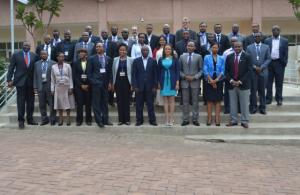Rwanda hosts high level meeting on tobacco taxation in the African Region
Kigali, 2 March 2015 -- The World Health Organization (WHO), in collaboration with the Ministry of Health and Ministry of Finance and Economic Planning of Rwanda have organized a two day workshop from 2 to 3 March 2015 to help governments improve health and increase revenues by identifying “best practices” for tobacco taxation.
Governments have the potential to use tobacco taxes to manage consumption, raise revenue and promote public health. Evidence shows that a well-administered tobacco tax leads to reduced consumption and its crippling health consequences, and not producing the terrible economic outcomes that are often portrayed by the tobacco industry.
The workshop was officially opened by Director General of Budget at the Ministry of Finance and Economic Planning, Mr Caleb Rwamuganza, in presence of the Representative of Ministry of Health, Director General of Cinical Services, Dr Theophile Dushime, the Director of Health Promotion Cluster at WHO Regional Office, Dr Tigest Ketsela, and the Acting WHO Representative for Rwanda, Dr Martins Ovberedjo.
In his opening speech, Mr Rwamuganza highlighted that there is no doubt that tax policy is one of the most reliable instrument for tobacco control. “We need to design our policies in such a way that we reduce both demand and supply of tobacco. We are all convinced that raising taxes reduces the use of tobacco. In addition, tobacco taxation has two objectives equally important.
“On one hand, taxing tobacco generates more revenue for our Governments and on the other hand, taxing tobacco has an impact on the consumption of tobacco. However, it is necessary to mention that it is not enough to increase tax rates but a proper design of our tax policies is also necessary. A proper tax policy design should consider the specificities of each and every country,” he added.
Echoing a similar message, Dr Ketsela said “the increase in tobacco taxes and prices is the single most effective and cost-effective intervention for reducing tobacco use, particularly among the young and the poor.
“A growing number of governments have used the revenues generated by tobacco excise tax increases to fund a variety of tobacco control activities and other health promotion efforts. To facilitate these efforts, WHO will continue to work with governments and Ministries of Finance in the Region to implement the provisions of Article 6 in the WHO Framework Convention on Tobacco Control [FCTC],” added Dr Ketsela.
The participants of the high level meeting on tobacco taxation include focal points for Tobacco Taxation and Tobacco control in the Ministries of Finance and Ministries of Health from selected countries in the Region, including Angola, Burundi, Ethiopia, Gambia, Ghana, Kenya, Zambia and Rwanda.
____________________________________
For more information, please contact:
Mr Jean Bosco Gasherebuka; Tel: +250 788 517 751; Email: gasherebukab [at] who.inttarget="_blank"




